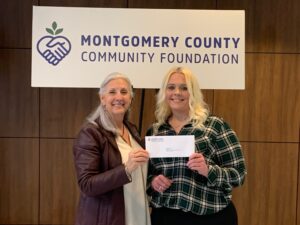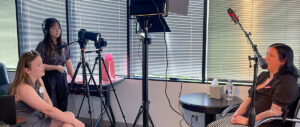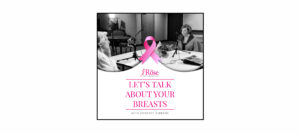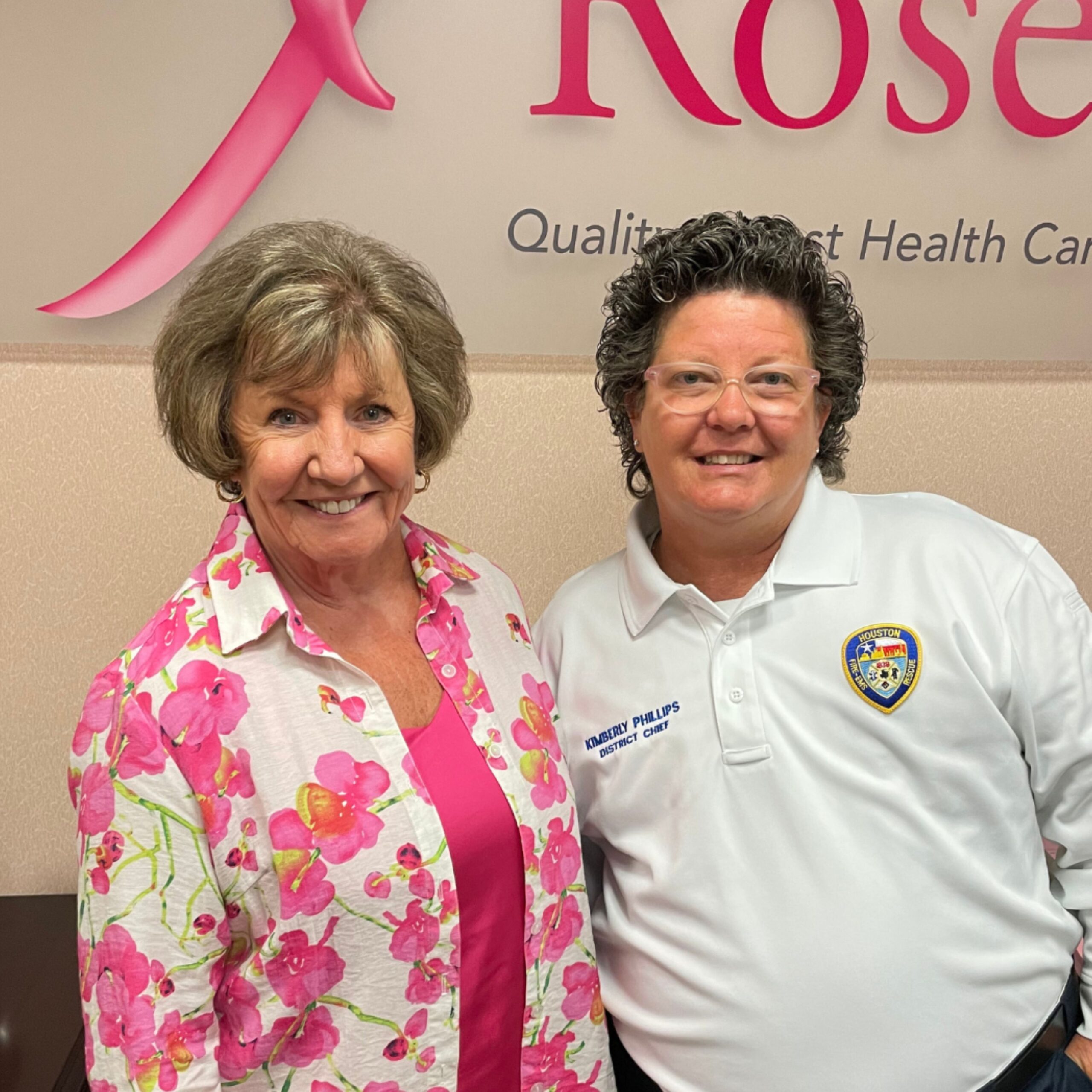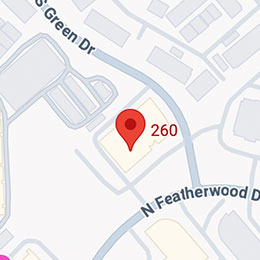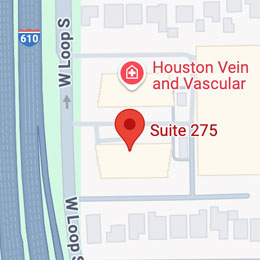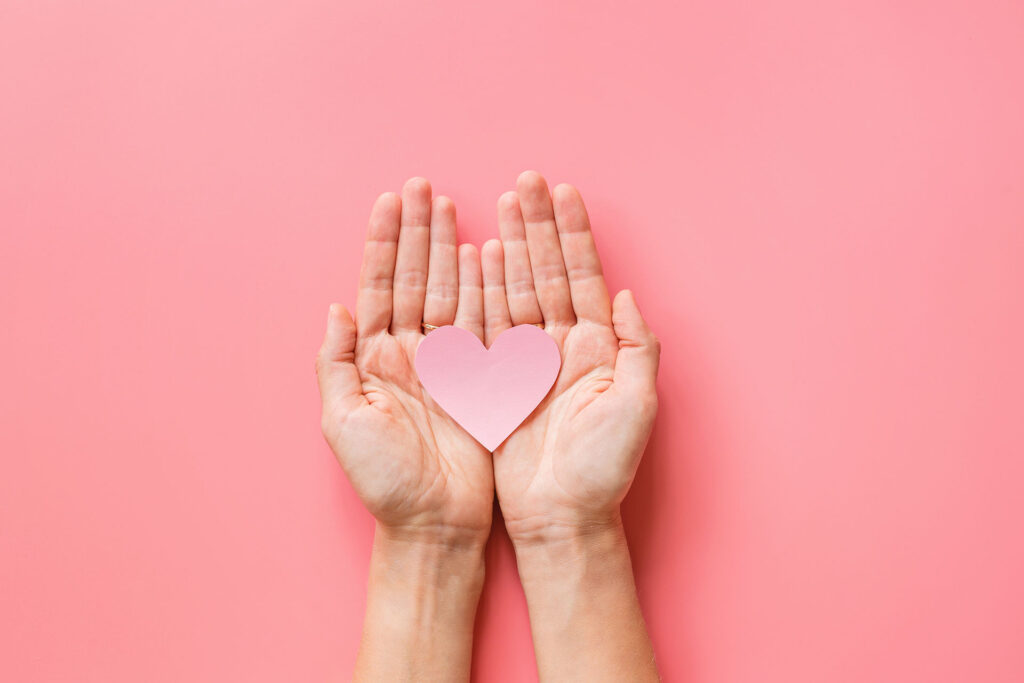Dorothy: [00:00:00] Kim Phillips is a district chief in the Houston Fire Department. She spent 21 years fighting fires and tells us that working in a man’s world was easy compared to her battle with breast cancer. She talks about having poltergeist breast and other things that went crazy after her diagnosis. What she created to get her through treatment is a ritual anyone could use.
Let’s talk about your breast. A different kind of podcast presented to you by The Rose, the Breast Center of Excellence and a Texas treasure. You’re going to hear frank discussions about tough topics, and you’re going to learn why knowing about your breast could save your life. Join us as we hear another story and we answer those tough questions that you may have.
Kim: I am Kim Phillips. I am a district chief in the Houston Fire Department. I’ve been with the department for [00:01:00] 21 and a half years. I’ve enjoyed every day of it.
Dorothy: So what’s it like being a female firefighter?
Kim: Well, I’ve, I’ve never been a guy firefighter, so I can only answer from my perspective. It’s… It’s amazing being a firefighter.
It’s an honor. It’s it really is. It’s hard work. I don’t think everyone can be a firefighter. Um, I think only a few can, but those that can They can be, they can be anybody.
Dorothy: So Kim, there’s not a lot of women that would choose this as a profession. So like you said, not everybody could do this. Physically, everybody could not do this.
It is hard work.
Kim: Oh it is, that’s true. Yeah, especially in the beginning, right, the physical regimen is hard. And sometimes it’s not just the physical labor, it’s mental labor too, right. You see people at their worst. And to me, that’s part of the honor, right? You’ve been invited. I mean, it’s not the, an engraved invitation into their [00:02:00] lives to come in and help them at a time when they didn’t expect to have to invite you.
Maybe someone is dying or they’re dead, or it was a car wreck at the, at the worst possible time. I mean, I don’t know who plans a car wreck, but that’s when you get to come see them and you do your best to make sure that you can, um, mitigate that the best you can for them. We’ve delivered babies. That’s always fun.
I mean, fun for, I mean, I’ve had a, had a baby. I don’t remember being fun at that time, but for me delivering a baby is always fun. Um, I mean, we’ve, you know, held people when they, when they died too. Fighting fire. We never want anybody’s things to catch on fire because that’s, that’s the most, it’s the worst possible thing, but you know, we’re always glad to, to do what we can to help them to get on the road back to being better.
So we’re always the first ones there and we’re hoping we’re the last ones to leave to make sure that there’s the best they can be.
Dorothy: You also are a breast cancer survivor. [00:03:00] Mm hmm. Talk to us about your journey and, and how it impacted the work that you do.
Kim: I, um, in the fire department, we have, our shift schedule is 24 hours.
It’s, it’s, it’s real important to just go over that real quick. We work 24 hours a time. We show up to work six in the morning, six 30 and we. Um, we fight about breakfast. Um, we, we fight about it, but we have the same thing every time. Um, and then we’ll fight about lunch, and then we make runs and calls, and then we argue about dinner, and then we’ll have the same thing over and over.
We’re like a big family, and so you live with these people 24 hours at a time, and you make runs, and you make calls, and you, you know, know their families. When I found out that I had… Cancer, I was actually driving to another station to go see, um, who’s my boss out in the field, but he’s also a good friend of mine, Chief Westhoff.
And the Dr. Baker called and said, Hey, we’ve done all your, you know, ultrasounds and the MRIs and the [00:04:00] things and the, I was like, yeah, yeah, yeah, I want, because you got to pull over, right? You’re driving the city car. If you wreck the city car while they’re talking, they’re, they’re really hostile about that sort of thing.
So I pulled over into this coffee shop I actually kind of wanted to go into one day. And he said, well, um, you have cancer. And he says, I don’t have any other way to tell you. Um, so, you know, hey, why don’t you, why don’t you come see me soon? And we’ll get started. I was like, well, hmm. Okay. You know, his nurse called me right away.
We made up an appointment a mile ahead. So I drove over to see Chief Westhoff and I was like, hey, uh, um, I didn’t do those reports you wanted. So I know you’re gonna be mad. And then I thought, oh, I’ve got an out, but I have cancers, , maybe I can get outta doing these reports. Um,
Dorothy: Kim ,
Kim: I finished the reports.
Dorothy: Uh,
Kim: so
Dorothy: And how did you, how did, did you just go in for your routine or had you found a lump? What had happened?
Kim: I always go [00:05:00] in every year for my routine. I just never miss it. ’cause firefighters have about a 40%. greater chance of getting any kind of cancer. Now, this is an interesting fact. Women in the fire service across the nation haven’t reached or have just barely reached statistical, um, the numbers are statistically relevant so that our cancers are finally being tracked.
Unfortunately, there’s not a really good agency yet that is tracking firefighter cancers other than our own doctors. Workers comp in Texas is, is terrible. At tracking those sorts of things. But we know from evidence that firefighters do have that 40 percent greater chance. We assume women too are in that group.
However, we have just fell across the line like three years ago. Wow. To be included in those studies. So they assume they’re still skating on the breast cancer part. So, but we assume it’s because I’ve been a firefighter for 21 years. I’ve [00:06:00] always been in the field. So.
Dorothy: But how do they relate that? That, that’s odd to me that your job, what you do could create, could.
Not cause it, maybe, but cause it to grow.
Kim: Well, it, I mean, they do say that it, I mean, it’s just a teratogenic effect because of the, like the perfluorocarbons that come from things that are burning. Your cars are made out of plastic and, you know, foam. And houses nowadays are made out of like Legos. Just, you know, everything’s plastic.
Um, gosh, and all the chemicals we don’t even know about. And Houston is the petrochemical capital of the world. I mean, we go to warehouse fires and goodness knows there’s no zoning in Houston. Who knows what’s on fire.
Dorothy: Right.
Kim: Um, now they’re saying, this was my favorite this year, which just made me lay my head down on my desk and just go, are you kidding me?
Our bunker gear, they say, has the bunker gear, the, you know, snowman outfit that we wear to go fight fire has, uh. [00:07:00] Potentially has carcinogens in it.
Dorothy: Oh,
Kim: and so when things get hot, of course, you know, your groin, your neck, um, underarms and firefighters become much more permeable. And then we are the worst.
The worst, after a fire, coming out and like sticking our fingers in our noses, eating a snack with these filthy fingers, just like, oh my god, y’all keep your fingers out of your ears and eyes and mouth. So, yeah, it’s just like toddlers, so.
Dorothy: So you came in for your annual.
Kim: Mm hmm.
Dorothy: And then you. They found something, they brought you back, and did your biopsy.
You weren’t worried during all that time. You weren’t concerned that it was something.
Kim: Let me tell you where I got concerned. I got concerned because I’m a paramedic, right? For 20 minutes I care very deeply. Your best chance of survival. in Houston is with a Houston paramedic if something happens. Because for about 20, 30 minutes, [00:08:00] we were the top of the line.
We have the highest save rate in the nation. And after 20 minutes, if you haven’t died or we haven’t gotten you to the hospital, we’re starting to get a little, you know, hey, you know, we gotta unload you on some nurses because we’re at our limit. Everyone was super nice to me. So the nurses were nice. The ultrasound tech was nice.
The doctor that came in eventually did the biopsy were super nice. They couldn’t have been nicer. And I thought something’s wrong.
Dorothy: Oh my gosh.
Kim: So normally it’d be routine, right? In and out, in and out. Everybody was super nice. And I thought, Oh, something’s really wrong. Oh God, they’re being nice. And so. And now there was, so,
Dorothy: so your, your intuition just went, it’s on, something’s going on.
Kim: Yeah.
Dorothy: Oh my gosh.
Kim: Yeah. And so I felt weird. So when the Dr. Baker called and I went and told Chief Westhoff and they said, we need to get you in for surgery like next week, let’s just do this next week. Cause we, all the lymph [00:09:00] nodes we tested were positive. Everything was positive. Everything we tested was positive and we can’t find the borders.
And they said, well. I said, I can’t leave work now. I got so many things to do. I got paramedics to move around. I got things I gotta do, goes, and Chief Westoff was like, you firefighters will be fine. I waited a month and a month. It went from stage two to stage three, and that was my fault. So I always tell people, go, just go.
It’ll be fine. Everything can wait.
Dorothy: Mm-Hmm.
Kim: So.
Dorothy: But believe me, I hate that idea that it’s your fault. No, I, I get it. That you wanna encourage women to go on and get it done. Mm. But we tend to want to take care of everything else get it all in place and do it on our time So that’s that’s not unusual. All right, you’re in surgery now.
You’ve had such an unusual Recovery Is that a good word, I mean,
Kim: it’s still recovering. Pardon me. Yes. Let’s talk about it [00:10:00] Well, I was super lucky and my friends and family all came over that was at the Not the night before, maybe the night night before. We had so much fun. We had a big barbecue. And, I mean, I think my lawn guy and his wife came over.
It was, that was always, we’re friends, everybody’s friends at my house. Um, we had a ton of people. We called it a Boob Voyage. So, so my sister was like, everybody can come touch them. It’s like, no, they cannot. So, and uh,
Dorothy: What? Say that again.
Kim: it was a boob voyage. So, you know, everybody else gets to go on a cruise. No, I got to just, you know, adios, you know, my chachas.
So, um, Yeah, so we had a Boob Voyage party, which was a ton of fun. Um, we drank a bunch and we had, you know, and then the next day, uh, I guess we just [00:11:00] recovered and rolled the drunk bodies out of the yard and, and went to the hospital and whacked, chopped them all off. And so it was really funny. And then you just spend the rest of the time recovering, right?
It was really sort of the first time I’d ever been off of my feet like that. It was sort of odd. Then we had the drains. The drains were spectacular. If you haven’t had, someone hasn’t had the drains, you’re gonna… My cats love the drains. Because they would fall out of your pocket. They look like these grenades attached to these tubes.
And I would wear things with pockets, you know, and I sewed pockets into things, so you could put your drains in. Because nothing’s more disgusting than, you know, talking to somebody and they’re staring at your hip, and you know, they got this little blood puss… You’re just like… So that’s another friend we can write off.
And, uh, my cats love to play with them at nighttime.
Dorothy: Oh no.
Kim: And just bat them.
Dorothy: Oh.
Kim: So,
um,
yeah, it was an [00:12:00] adventure. Everything was an adventure.
Dorothy: I can’t, I know you’re, I need you to be serious for a minute.
Kim: I am serious.
Dorothy: because your, your recovery was not, and, and one of the reasons why I want you to talk about it is because people I think that if they have something that just doesn’t work like clockwork or it didn’t heal or whatever that it’s something unusual wrong with them for you, you had more than your share of that kind of stuff.
Kim: I, you know, yeah. And I mean, I, that’s why I appreciate this. I wish I’d known about this beforehand because I kept thinking, does this happen to everybody? And they’re just, there’s like some top, they were told not to tell anybody. Yeah, so I got lucky again, the Houston fire department has been so we try and take care of firefighters with cancer because we know what happens.
We know the workers comp system isn’t taking care of us. So they, I got, I’m so grateful that the chiefs I work for, they moved [00:13:00] me to a desk job. So I got to work Monday through Friday on a light duty job. Um, and the girls I work with were, they were so funny when I thought I’d have a problem. I just. open up my shirt because one of them was a paramedic too and I said, does this look weird to you?
And she’s like, your whole front looks weird. Which part looks weird. And you know, I’m like, does this look infected? And then one time, yeah, it’s, she’s like, cause they put the implants in, right. Cause it was going to have reconstruction. And she’s like, well, I mean, other than the normal lunar landscape, you know, and yeah, cause they got this Dumbo ears on the side and, and, you know, And everybody says, that’s normal.
I’m like, well, we need some pictures, like a little, you know, board book where, you know, this is normal looking. And there was an infection,
Dorothy: Oh
Kim: in one of the implants. And the doctor said, go right now to the hospital. Just go. We’ll meet you there. I was still in my uniform. I went into the hospital and, uh, [00:14:00] It was weird.
I didn’t know how to get to the hospital except through the emergency room. So I was just all waving. Hi, it’s just me. No, nobody’s in trouble. I’m just checking myself in. And there was an infection. Sure enough, went in, they took the implants out, they put this thing in, this little mat that has like, antibiotics in it, and they shoved that in there.
But anyways, the night before I was laying in the hospital bed, I was wandering around the hospital because I was bored. Right? You know, there’s nobody to talk to. I come back and the nurse is like, why are you bad? And I was like, everywhere. I’ve been all over this whole hospital. Did you know they have these little robots?
And she’s like, you have COVID. And I’m all again.
Dorothy: Oh no.
Kim: And so I only say that because when I, they took the implant out, there was no infection, no fungal infection, no bacterial infection. I think I had COVID Ti*ies.
Dorothy: What?
Kim: Mhm. Can you say ti*ies on the air?
Dorothy: Yeah, you, yeah, you can.
Kim: Okay.
Dorothy: I don’t, but you can.
Kim: Thank you. So the, uh, the only thing they can think of is.
I get covid at the [00:15:00] drop. I’ve been vaccinated. Get your vaccines. The minute your doctor tells you, get your vaccines, they think that I had just enough antibodies to go, something’s not right. And so it attacked my left boob.
Dorothy: Oh my gosh.
Kim: Fake boob. My Foob.
Dorothy: Your-
Kim: Foob. Foob. Fake boob. And so they took ’em out and that was the first.
And I was in drains again. And so my mom took up the habit of naming all my drains. So each time I had two, they were in for like six weeks and they’re horrible. They get in the way. You have to shower by hemispheres, right? You can shower the bottom hemisphere, or the top hemisphere, but never both at the same time.
So the first set was, oh, what are those eels on the, my niece got to name them from, uh, Disney. Floatsam and Jetsam. Those were the first ones.
Dorothy: Oh, okay.
Kim: And then, uh, the other ones were Bonnie and Clyde.
It was horrible. So, yeah, that was the first round of disasters. And [00:16:00] then it just keeps being a disaster. So it’s just, it just never ends. And that’s, that’s why I guess it’s the one thing I could pass on. So it would have been finished radiation in February of this year. So in March, May, May was when I found out I had cancer.
Yeah. So they got on the ball. LCC bulls. I mean, they were on the jump. They were great. Um, and that whole year. I mean, it’s just constantly just one whirlwind after another. So I’m really appreciative of the doctors and nurses telling me what was coming. But man, it sure seems like there would be some more information on, Oh, this is perfectly normal.
Dorothy: Right. Right now, there’s so much that goes on and happens and you’re right. And I think that’s a great idea to have a book that actually shows what this actually looks like. You’re swollen, you’ve got all this other stuff that’s not in place, and you know what [00:17:00] your body did look like, and now it’s very different.
I think that’s a great idea. But now that you’re a treatment, you also had chemo?
Kim: I had chemo, yeah, that went on for like, I don’t know, 700 years. It was, um, the first one was the tax, uh, the, I can’t remember anything. Tax.
Dorothy: What Taxotere was it?
Kim: Mm, mm.
Dorothy: You had the Red Devil.
Kim: The Red Devil was the first one. I didn’t, I looked that one up.
And that one was, because I’m a, I tried to post, every time I went for chemo, I tried to post something on Facebook, just to. Because I also saw all the people around me, which were all firefighters, right? They were all fix the things around us sorts of people. We don’t… And I was really sort of… We’re like Cheerios.
Like, we run around in a bunch. We’re not really solitary people. Don’t wish we weren’t quite so touchy. I don’t know why they touch each other all the time. Um… [00:18:00] And they were uncomfortable. For the first time, all my friends were uncomfortable and I was like, well, I don’t like that. That’s not good. And so I would always, when I had chemo, I would always tell them, hey, send me pictures of your pets.
send me pictures, you know, you show me that made me feel better. And so it was all of a sudden everybody was sending pictures of their pets and one person went and found their neighbor’s pets and took pictures of them. And I’m like, you’re going to be arrested. Stalker. Um, but it, and then all of a sudden everybody could talk and it was really nice.
And that was the opening. But when I found out about the, the red devil stuff, Which, as a scientist myself, which was interesting to me was apparently the scientists when they’re trying to find out something that would attach to the cancer cell to stop it from replicating, they tested like 17, 000 different organic and non organic things.
I’m trying to picture who this guy or girl was that wandered out into the forest, found this one [00:19:00] tree, it’s a redwood tree, and I have the name, it’s on my Facebook feed, and said, And, you know, it’s apparently really toxic to lick. I’m all, did you lick the tree? And then decided, oh, let’s give this to cancer patients, that’ll help them.
I’m just like, how does this come, how did you come up with this? You know, but apparently it helps. So,
Dorothy: it does.
Kim: So that kind of kept me sane was research and all the things they were giving. And then sometimes it, I was like, I don’t want to know any more about this. I’m sure you’ve got it. So I went through like, started in September, no, I went all through the summer, all through the winter.
My last chemo was in November. It was awful.
Dorothy: So tell us how you got through some of those days when you really couldn’t even go to work. I know you had some of those.
Kim: Work was actually what sustained me. It was nice that those people, I knew they were waiting. They didn’t really have much for [00:20:00] me to do because, like, well, we didn’t.
They wouldn’t give you a project, a really important project, because what if you die? And then, I mean, we won’t even know where you left off. And then, you know, so, you know, that’s firefighters for me.
Dorothy: Gosh.
Kim: So, um, they were so fun and funny. And I mean, some of the funny gifts that the, my two friends, Dana and Jennifer would, I mean, it’s, I’m not even going to talk about them on the air.
Dorothy: Okay.
Kim: Because we need our jobs.
Dorothy: It’s probably be better now. We can get by some of this. Okay.
Kim: Okay. Thank you. Thanks for having me.
Dorothy: You too.
Kim: And, uh, mm hmm. So. I don’t know. I don’t know what did it. My family was always, my mom would always call and yeah,
Dorothy: but you had a special approach to
Kim: every day. Yeah. And so that’s kind of,
Dorothy: I think that’s just so brilliant.
Kim: Every day you had to just every day, right? You just had one day at a time. I just got to get to the day. And so when I started this whole journey, I was like, I just need to keep track of each day. And every day is important. I remember [00:21:00] I’d read somewhere some Tibetan, some Buddhist thing was like, look, every moment is important.
I mean, don’t rush them along, right? Because you only get so many and then they’re done. You never know when you’re going to run out of them. And so I started making those heads.
Dorothy: And you’re going to have to describe those heads because remember, not really.
Kim: Oh, that’s right. Yeah. So the heads are made out of clay.
They’re just like little fimo clay. Just nothing. Just a little pinch of clay. I’m not, you know, seven days of, you know, creation sort of thing. But. So if it was a good day, I’d toss like a pretty bead into a jar. I’d have like this apothecary jar. It’s about 12 inches tall. And I’d take all the bracelets they give you, you know, when you go into the hospital and or get chemo, you know, you know what it was.
Okay, this is chemo treatment number 12, you know, 900 to go and If it was a bad day, then it’d get like an ugly head, it’s like red or, you know, horrible. Every day of radiation, every day of radiation got a green head. Oh. Radiation green head. [00:22:00] The bad days, like when you just didn’t feel good or you felt like you were just like, okay, that’s…
This should be the last day, shouldn’t it? You know, got the ugly ones. But then the days where it’s like, okay, I don’t feel good, but… I’m gonna put a shoe on and… most of my pants. And then I’m going to go to work. Just got just like a normal plain old blue or white head and just wandered on. And so at the end I look at it and I have this jar and it’s full of heads and beads.
And I always kind of thought I’d string them up, maybe, you know, on a necklace and go, look, this was it. This was the whole journey right here.
Dorothy: And did you do something weird with your bracelets?
Kim: With my bracelets. Oh. I cut ’em and I put ’em in the jar and I’m gonna wind them up.
Dorothy: And they were part of the Yeah,
Kim: they’re in there.
I’m gonna wind ’em up into a bead and put ’em on there too.
Dorothy: Oh, okay. That’s what I remember trying,
Kim: so then you can see every one is the time I was in the hospital or you know, chemo or radiation or if I had to say my birthday one more time.
Dorothy: Oh, right.
Kim: [00:23:00] Yeah. Mm-Hmm. .
Dorothy: Well that’s important. They’ve gotta make sure you are you.
Kim: True. Mm-Hmm, true.
Dorothy: You know that, you know how that goes.
Kim: Yes.
Dorothy: So this treatment though isn’t over because you’re still battling one more thing.
Kim: Still doing it. Yeah. So that’s the other thing is I kind of, I was kind of on the fence about reconstruction, right? Because my supermodel career is just about over. Um, I mean, I could, I guess, get back in it, but, um, uh, Oh, don’t remind me to talk about Knitted Knockers.
Dorothy: Oh, well, I want you to also talk about the way your breasts, you know, how they no longer were yours. They were, it was like they were paranormal.
Kim: Oh yeah.
Dorothy: Yeah.
Kim: Oh, that’s the only thing I can figure out what’s happening now is, um, yeah. Yeah, and so when I was pondering, I always kind of thought in my head that when this whole, you know, putting a head in the jar every day, I kept thinking, okay, when we do reconstruction, I decided on the deep flap, [00:24:00] right?
Because I gotten so swollen from the steroids every day for, you know, steroids or every week from steroids. Um, I thought I’m gonna do the deep flap surgery, you know, get back in shape. And then that’s what we’re going to do. And when the plastic surgeon is like, you’re still too swollen. I was like, okay, so it’s still kind of weak too from all the medication you’re taking, right?
Get back in shape. Went back again. I said, no, not yet. Soon. I’m just, and I just started crying, which is not like me. I’m not normally a crier, right? I’m generally pretty upbeat and uh, because that I thought was the end when we could schedule that surgery. I thought that’s the end. Once we get this son of– this event over with, I’m done.
I am finished. I never have to look at this place again. Not that they aren’t nice. They’re very, very nice people. And I could just never get it. So now, in addition to every joint and bone and thing hurting all the time, I’m also trying to run, I walk like five miles a day, I’m trying to eat right, I’ve lost [00:25:00] like 60 pounds, and you still feel like you’re under the gun.
And you, in your mind, you’re like, why am I still having to do this to keep getting healthy?
Dorothy: Yeah.
Kim: But, I would tell people, fat stores estrogen. The more fat you can get off of you, the less estrogen you’re going to hold on to for breast cancer people. Right? So look at it like that. So I tell myself the more estrogen you can get off, the less you’re going to have to face this again.
You know, every time you have to go do a PET scan, it’s the less chance that you’re going to have to, you know, lay there and go, are they going to find something again? So I tell myself, that’s fine. You’re doing it not just to look better. I mean. It wouldn’t want to look like this. But, so you can be healthier too.
Yeah, but my whole, and now I’m back into the drain situation, right? Because I have this perennial seroma infection. Uh, um, that I gotta go in and have another drain put in. [00:26:00] But at least it’s just one, so, on the bright side. But I’m having the doctor write a note that I can wear civilian clothes to work. So I don’t have to wear a uniform?
Oh, can probably wear your own. No, I can’t. Oh, right. I want to wear a comfortable sweatshirt.
Dorothy: See, that’s important. Taking control of what you can, right?
Kim: So, um, yeah, so I was laying there a few, a couple months ago. I was like, as near as I can tell, these are just poltergeist t*ts. That’s it. That’s the only thing that comes to mind.
So I’m at work the other day and, and we have a really religious lady. She’s very sweet. And then I have all my friends who are not very sweet. And I sit. One of my friends is like, that’s it. We have to go to the Bruja. That’s the only thing that’s going to fix this. We have to go to the witch doctor. And I was like, well, okay, but my deductible, I mean, I don’t know, is there a deductible?
Do we have to do a deductible again? So, you get to a point where you’re like, that’s fine. She’s like, well, maybe put sage in your bra. I was like, I [00:27:00] don’t think, Oh, I don’t want to do that.
Dorothy: But Kim, these people are keeping you really going.
Kim: True. I mean, Once you get to
Dorothy: You’d love to have those kind of friends when you’re really facing something.
Kim: Yeah. Once you get to the point where they’re, um, they can make fun of you, that’s, that’s sort of the point where you’re like, okay, we’re good now.
When they were being delicate and sensitive, you always kind of felt like, maybe I am dying. I don’t, you know, maybe I am, and maybe they know something I don’t know. What did somebody, did somebody say something to them when they say, you know, stuff like what firefighters say, you know, like the other day I was telling him, I was like, I was eating some grapes at my desk and I dropped a grape.
I was like, well, shoot, I dropped a grape. And then the office cleaning lady was coming. She’s, she’s a breast cancer survivor too. She and I were talking and, um, we had a nice long conversation. So I was like, Oh, I don’t want Sylvia to [00:28:00] have to pick up, you know, grape or anything. So I’m like, where’d that grape go?
I’m all wandering around looking for a grape. I was like, well, all right, so I finished my work and I went to the bathroom and there was a, you know, a grape fell out of my shirt, my uniform shirt, button down shirt. And I was all. If I’d had boobs, they would have just bounced off my boobs onto my desk. But no, now sh*t just goes straight to the ground.
So, yeah, so. And Dana. My office was all, Kim’s just not gonna drop stuff on the floor, so. Mm hmm.
Dorothy: So Kim, what other advice do you have for people trying to get through this time? I mean, I don’t think everybody can quite embrace all of… The ways that you’ve learned to do this.
Kim: I know I’m lucky because I have generally always had a positive outlook.
I try and make the best of every situation. I think being sometimes a woman firefighter has helped, right? Because sometimes you do have to look at a situation and go, [00:29:00] perhaps, perhaps they are being mean to me because I’m a girl or I’m a paramedic, but, or I can make the best of the situation. And just, uh, maybe it’s just a one off.
And after a while you just learn to go, okay. It’s fine. This, this is the way it was. You learn to let stuff roll off of you.
Dorothy: But you’ve also seen a lot of things that give you a different perspective.
Kim: And I do see that. And then every day, and I remember one time I had to go in for an infusion or a transfusion, I’m sorry.
And for a minute I was waiting out in the waiting room and I saw these little kids and they were cancer people too. And so we were sharing. Heads, you know, look my, I don’t have any hair either, you know, and one little girl had pretty little earrings. That’s all she wanted was little earrings. And so her mom had her ears pierced and, um, So they were wandering around and see, here’s where I cry.
And so they were wandering around and they were having a good time, right? Because they get to ride in little fire trucks and, but their moms and dads faces were so sad. I was like, [00:30:00] well, I would do this a thousand times again, exactly like this, or worse. If we could just find a way for kids not to have cancer.
Dorothy: Mm hmm.
Kim: So, yeah, you do. You see all kinds of things that are just like, Okay, at least I didn’t have to do that.
Dorothy: Right.
Kim: Or nobody died. Or, Hey, I am going to get better so that I can keep helping other people. And that makes it sort of worth it. So, you know, just, That’s it. And, um, There’s always something to live for, right?
Maybe you got family, or maybe you have an idiot cat like mine who wouldn’t survive if I wasn’t there to point her in the right direction. So, that’s it. You know, hey, maybe there’s a possibility of a date out there, or um, your Temu order’s coming in. Every day has something. Every day. Every day has [00:31:00] something to look forward to.
And that’s it. Just take it a day at a time. That’s all we can do. Chop off a few heads if you have to. Every day. I look for heads to chop off. Yes. Every day. So, that’s it. That’s the only way I made it. Just a day at a time.
Dorothy: Kim, we love having you on this podcast. Thank you. And you brighten our day. And I cannot tell you how.
How many times I have thought about some of your ways of dealing with This kind of hard stuff and it is hard.
Kim: Yeah, well Lots of people get through it and lots more will get through it and we’re gonna make We’re gonna make progress. I am confident of it. We can put people on mars. We can certainly
Dorothy: Have we put people on Mars yet?
Kim: I think we could do it if we tried a little harder. Yeah, I have a list of people I would like to put on Mars.
Dorothy: Before we put people on Mars, Kim, What can we do in the immediate future, right now? What can we do?
Kim: Well, actually, [00:32:00] the, uh, my friend, best friend, Karen Dupont, she’s the one who put me in contact with you.
You know her. She’s funny. She, uh, oh my God, she’s so funny. She and I have been quilters for a long time. I got us started on this as firefighters are overrun with t shirts. Overrun? Just overrun with t shirts. And we started making t shirts for firefighters, for us, really, for our station beds. Remember I told you we
Dorothy: Making quilts.
Yeah.
Kim: Making quilts, right?
Dorothy: Out of the t shirts.
Kim: T shirts, right?
Dorothy: Right.
Kim: And because we It’s a fire station, right? Everybody has a bed or the couch if you snore. And so we try and donate three a year to a charity. And now we, so we had a firefighter that had was burned in a fire. So we raised a bunch of money for him.
We’ve sold one for, one went for a bunch of money for firefighter scholarships for colleges, their kids. But lately we’ve been doing ones for cancer, we did one this weekend, um, for the firefighter rotary house. We’re trying, our union’s trying to raise money to build a house. Right now we have nine apartments we rent [00:33:00] for firefighters and their families who need long term treatment in the medical center.
Um, usually cancer is what gets us most of the time, or their families. And we made a gorgeous quilt, gorgeous quilt, and we sold it for charity this week and raised some more money for, um, the firefighter house. So, we were pretty excited about that. Karen did the lion’s share work on that one. I just gathered the t shirts up and cut them out and said, Karen, help me, please, help.
Dorothy: So, Fight a fire one day, the next day you’re doing a quilt.
Kim: Man, you gotta keep moving around here.
Dorothy: Yeah.
Kim: Yeah, you gotta do something in 610 traffic. Oh, oh. Might as well quilt.
Dorothy: Might as well quilt.
Kim: Might as well quilt.
Dorothy: Alright.
Kim: Okay. True, true.
Oh,
Dorothy: Kim, you’ve been a delight.
Kim: Thank you.
Dorothy: We love having you here. And one of the things Kim has said is she’s willing to talk to anyone. That might need to know what it’s like, and probably you’ll, you’ll get a lot more from it than, than you expect.
Kim: All the time. Anytime. [00:34:00] Day or night.
Dorothy: Anytime.
Kim: That’s right.
Dorothy: Thank you again so very much.
Kim: Anytime.
Dorothy: So that wraps it up for today, and don’t forget, we’re doing a episode every single day. You’re going to get your daily dose of Let’s Talk About Your Breasts during the month of October.
Post Credits: October is the month of pink, and for The Rose, a breast center of excellence. That means we’ll be airing podcasts every day in October to celebrate Breast Cancer Awareness Month. We’ll be sharing everything from men who have had breast cancer to what happens when you are pregnant and diagnosed with cancer.
Be sure to share with family and friends because there’s a little something for everyone. To find out ways to help The Rose, visit our website at therose.org. Remember, self care is not selfish. It’s essential.

